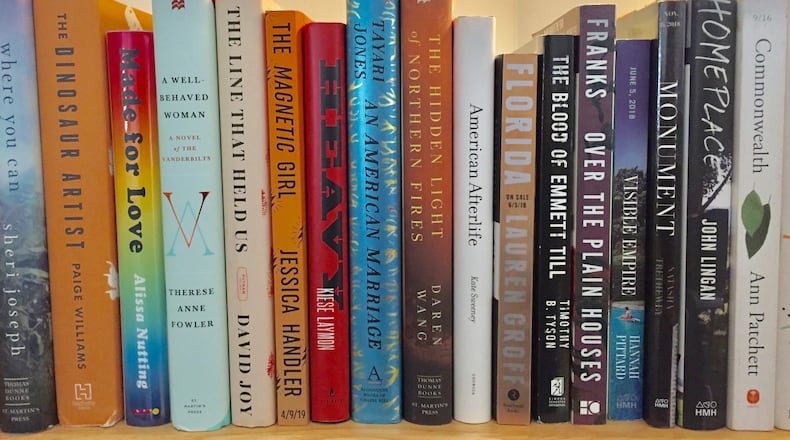De'Shawn Charles Winslow's enchanting debut novel, "In West Mills," paints vivid, decades-spanning portraits of the residents of a segregated rural mill town in North Carolina who harbor long-held secrets. Here, family trees twist and turn so abruptly they're on the verge of being uprooted.
In 1941, 26-year-old school teacher Azalea Marie “Knot” Centre passes her time on Antioch Lane re-reading her favorite books (including Charles Dickens’ “The Old Curiosity Shop”), dancing and drinking the night away at Miss Goldie’s barn house juke joint and writing heartfelt letters to her father, a dentist back home in Ahoskie, North Carolina. It’s her beloved “Pa” who had encouraged her to go into teaching in the first place and introduced her to the wonder of books when she was a young child. “When he read to Knot at night, she would hold on to his long, rough goatee so that she would know when he got up.”
Knot relishes the companionship of lovers, but after she’s had her fill, she discards them quickly. She’d much rather be alone than have a “nagging man looking over her shoulder.” When her most recent suitor, Pratt Shepherd, accuses her of having a “love affair” with moonshine, a vice she can’t deny, Knot kicks him out of her three-room railroad home for good. Pratt isn’t surprised. He knows he’s never been high on Knot’s priority list: “Corn liquor, the books, them letters from her Pa, and then me. Maybe.”
Soon thereafter, Knot realizes she’s in the “family way.” Because Knot is already treated like a pariah by most townsfolk for her loud-mouthed cursing and her scandalous behavior, she weighs the decision about what to do with the baby carefully. “As scared as Knot was of being someone’s mother, she was more scared of dying on some old woman’s kitchen table, trying to avoid becoming someone’s mother.” After confiding in her neighbors, a local farmer named Otis Lee and his wife Penelope “Pep” Loving, Knot decides to continue the pregnancy to term. Otis Lee and Pep help her find a couple to adopt the baby.
Hiding a pregnancy from West Mills’ gossips is no small feat, though Knot certainly does try. The Lovings assist her in spreading the rumor that Knot is sick with the pox, and can no longer teach until she fully recovers. But people within Knot’s tight inner circle — including Valley, an outcast because of his love of men, and Miss Noni, Otis Lee’s nosy 89-year-old grandmother — pick up on Knot’s condition almost immediately. Luckily for Knot, they promise to guard her secret. “Just ‘cause I talk ‘til I’m tired don’t mean I can’t hold a secret,” Miss Noni tells Knot. “I got secrets in here … that’ll make folk hate me if they got out.”
Seeing her newborn daughter’s face shortly after her birth unravels Knot. “Knot looked up and caught a glimpse of the child’s face. Her eyes were wide-open, taking in the world. It was the prettiest, and most dangerous, glimpse Knot had ever taken in her life.” And though Knot grieves giving up her child, ultimately, she is grateful to the kind couple, Phillip and Lady Waters, who adopt baby Fran and raise her in West Mills where Knot can at least watch her child grow up.
What Knot wishes for Fran is the kind of loving, nurturing relationship she never got to experience with her own mother, Dinah, who treated her youngest daughter coldly and deemed her copper-red hair an omen for her rebellious streak. By giving Fran up for adoption, Knot avoids what she worries she may have inherited from Dinah — a cruelty toward children. “It felt safe to her — the only kind of safe Knot felt all right with. Safe by not having to worry about hurting a child’s feelings, the way her mother had hurt her.”
Though Knot may be a fiery, headstrong woman always in a race to outrun her vices, she has a deeper, more contemplative side, too.
The tender relationship at the heart of the novel is between Knot and Otis Lee, who loves his chickens, or as he calls them, “cluckers,” almost as much as he does his young son Breezy. Among other things, Otis Lee and Knot share the same kind of heartache over family members who have abandoned them. Years earlier, Otis Lee’s much older, white-passing sister Essie had abandoned Otis Lee and their mother and moved to Brooklyn, where she met her husband and helped run their brothel. When Otis Lee was 10 years old, he stayed with Essie for several months, doing odd jobs for her, with the hopes of convincing her to return to West Mills with him. She outright refused. Otis Lee hasn’t seen her since, and he doesn’t understand why.
Author Winslow pens layers of complexity in a narrative that is surprising and irresistible at every turn. He bestows upon his readers the gift of decades, following his indelible characters from the early 1940s, when West Mills’ men enlisted to fight in the second World War, through the civil rights movement in the 1960s, when residents read about activists in nearby Greensboro engaging in sit-ins, to more than a decade after the last U.S. troops were withdrawn from Vietnam.
“In West Mills” is a refreshing and arresting book that shines a light on a woman who rebels against society’s strict and unforgiving social norms, despite the costs. And although times can be tough for her, fearless Knot always finds a way to put things in perspective. “Life is funny, ain’t it?”
FICTION
‘In West Mills’
by De’Shawn Charles Winslow
Bloomsbury
272 pages, $26
About the Author
Keep Reading
The Latest
Featured



